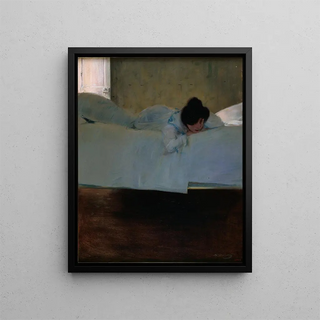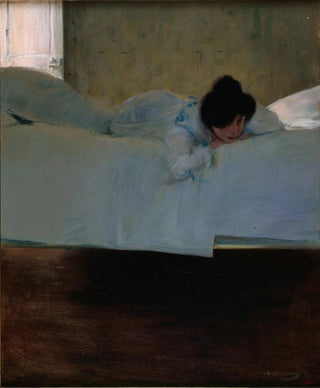Art print | Laziness - Ramon Casas


View from behind

Frame (optional)
In the vibrant universe of art, some works stand out for their ability to capture the very essence of humanity. "L Paresse" by Ramon Casas is one of those creations that, through its boldness and depth, invites viewers to reflect on human nature. This piece, created at the end of the 19th century, is set within a lively artistic context where modernist movements are beginning to emerge. Casas, an iconic Spanish painter of Catalan modernism, manages to transcend his era by offering a unique and intimate vision of laziness, a theme that is both universal and timeless.
Style and uniqueness of the work
Ramon Casas's style in "L Paresse" is characterized by a daring approach to portraiture and a refined use of color. Warm hues and subtle contrasts create an atmosphere that is both gentle and melancholic, where light seems to play a central role. The artist succeeds in conveying a sense of rest and contemplation through the relaxed posture of his subject, who appears to surrender to a moment of tranquility. The meticulous details, such as the folds of fabric or facial expressions, reveal undeniable technical mastery, while maintaining a certain lightness. This work does not merely depict a state of being; it invites the viewer to feel the softness of a suspended moment, to appreciate the beauty of laziness.
The artist and his influence
Ramon Casas, a central figure of Catalan modernism, established himself as a pioneer in the Spanish art world. Influenced by European currents of his time, he integrated elements of Post-Impressionism and symbolism into his work. His innovative approach to genre painting, as well as his ability to capture moments of everyday life, paved the way for many contemporary artists. Casas does not just paint scenes; he tells stories, evokes emotions, and explores the subtleties of the human condition. His influence endures today, inspiring a new generation of artists seeking to express deep feelings through evocative visuals. "L Paresse" is thus not only a reflection

Matte finish

View from behind

Frame (optional)
In the vibrant universe of art, some works stand out for their ability to capture the very essence of humanity. "L Paresse" by Ramon Casas is one of those creations that, through its boldness and depth, invites viewers to reflect on human nature. This piece, created at the end of the 19th century, is set within a lively artistic context where modernist movements are beginning to emerge. Casas, an iconic Spanish painter of Catalan modernism, manages to transcend his era by offering a unique and intimate vision of laziness, a theme that is both universal and timeless.
Style and uniqueness of the work
Ramon Casas's style in "L Paresse" is characterized by a daring approach to portraiture and a refined use of color. Warm hues and subtle contrasts create an atmosphere that is both gentle and melancholic, where light seems to play a central role. The artist succeeds in conveying a sense of rest and contemplation through the relaxed posture of his subject, who appears to surrender to a moment of tranquility. The meticulous details, such as the folds of fabric or facial expressions, reveal undeniable technical mastery, while maintaining a certain lightness. This work does not merely depict a state of being; it invites the viewer to feel the softness of a suspended moment, to appreciate the beauty of laziness.
The artist and his influence
Ramon Casas, a central figure of Catalan modernism, established himself as a pioneer in the Spanish art world. Influenced by European currents of his time, he integrated elements of Post-Impressionism and symbolism into his work. His innovative approach to genre painting, as well as his ability to capture moments of everyday life, paved the way for many contemporary artists. Casas does not just paint scenes; he tells stories, evokes emotions, and explores the subtleties of the human condition. His influence endures today, inspiring a new generation of artists seeking to express deep feelings through evocative visuals. "L Paresse" is thus not only a reflection






